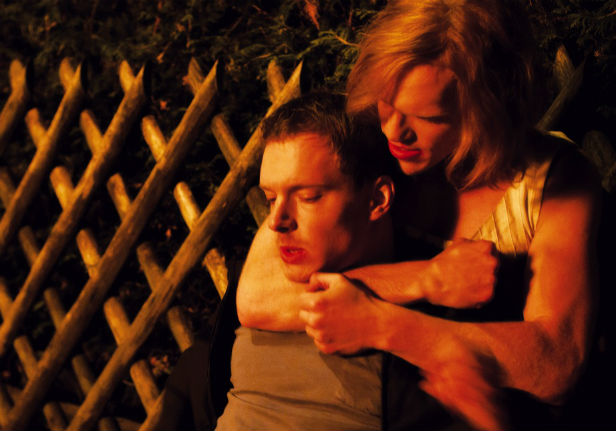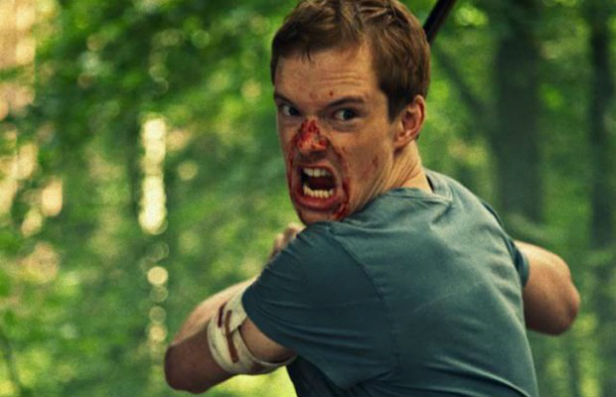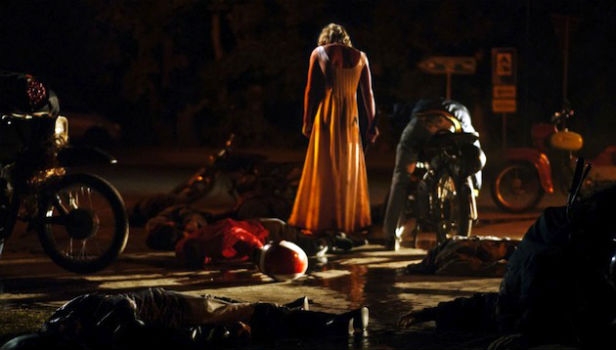 Till Kleinert’s The Samurai was one of the most unusual and striking films to come out of last year’s FrightFest. A dream-like blend of David Lynch, Angela Carter and the Brothers Grimm, it tells the story of Jakob (Michel Diercks), a small town cop who must protect his village from a charismatic loner in a dress (Pit Bukowksi) who’s wreaking havoc with his samurai sword. The closer he gets to his target, the stranger the night gets and more and more repressed feelings bubble to the surface.
Till Kleinert’s The Samurai was one of the most unusual and striking films to come out of last year’s FrightFest. A dream-like blend of David Lynch, Angela Carter and the Brothers Grimm, it tells the story of Jakob (Michel Diercks), a small town cop who must protect his village from a charismatic loner in a dress (Pit Bukowksi) who’s wreaking havoc with his samurai sword. The closer he gets to his target, the stranger the night gets and more and more repressed feelings bubble to the surface.
We talked to Kleinert about his fairytale inspirations, how the film has played at LGBT and horror festivals, and the state of German horror. “Have you seen the film?” he asked us.
Yes, we have.
That’s nice, because the first question I’m always afraid of is “describe the film in your own words” or something like that. I hate doing that! So please don’t ask me that! [laughs]
I guess we’ll start with the other standard question, which is where did the idea for the film come from?
Well, it always starts quite innocently enough, with some kind of central image that pops up at some point. It sounds cliché but sometimes even a dream image or something that comes up, like a lucid daydream. This came to me when I was travelling back from the Baltic Sea to Berlin by train. You pass through these densely forested landscapes where the track bed is a bit heightened, and you look down on all these little villages and they seem very small, like miniature towns or something at the side of the tracks. It was at dusk and the shutters were all down on the windows and it looked almost like they huddled together, as if to brace themselves against some perceived threat that might come in from the forest. So it was a very alluring image.
Then all of a sudden popped up this dream image of this one guy roaming those empty streets, this weird figure or silhouette in a dress with a sword and rattling his sword against the fences. And those questions began, why is he there, what is he looking for? That’s basically it, I think you can sense some themes or agendas within the film but I think they are not there from the start. It’s like analysing a dream. Of course the dream is always about something. But it’s about the dream and not the analysis.
The film does have a wonderful dreamlike atmosphere.
It’s interesting because it was in the process of development getting that. It’s quite clear that this figure, The Samurai, is real in the sense that he’s in the flesh and he’s there in the world, but he’s not like this person that you can pin down on a sad childhood or anything. He comes out of the forest and he comes looking for one guy, this almost myth-like thing. In the beginning I was thinking maybe this is like a crazy guy, this is someone who lives there at the fringes of town, maybe with his mother all alone in a house like this Buffalo Bill, Silence Of The Lambs thing.
It’s like a police investigation. Who is this guy actually? You can get a grip on his motivations but you have to relate everything he does to Jakob. And I think this really tight bonding between those two, this came in the process of exploring the character.
There’s definitely a Brothers Grimm influence there too. Did that naturally come from the setting or was it always in there?
It comes from the landscape, and also I grew up with them, read them every night at bedtime so I think obviously they have a huge influence on me. I like in them this sort of dreamlike approach to what you might call real life issues that you face growing up.
You always have these kids being separated from their parents, having to go through the forest to face monsters and trials in order to hopefully come out as a whole human being at the end, and I love this entering a dream world landscape to face these real world issues. There are some motifs; the wolf is always been an indicator for sexual violence and also sexual impulses that can’t be contained so I like that. And also even the crossdressing element, because the Samurai is wearing a dress and visits the grandmother at one point, and again in Little Red Riding Hood the wolf himself is a crossdresser at one point. So these elements are quite deliberately in there but it’s not like I can tell you it’s in there because it’s supposed to relate to that. It just felt very natural to enter this particular park of motifs and themes.
 Was Neil Jordan and Angela Carter’s The Company Of Wolves an influence too?
Was Neil Jordan and Angela Carter’s The Company Of Wolves an influence too?
I never thought about that during the making of this film but it’s a film that hugely influenced me and I really love it. But for some strange reason I never revisited it while I was making the film. Then after it was finished someone pointed it out to me and I was like “Yeah, sure!” It’s one of the most obvious comparisons. One I always choose is The Hitcher. In terms of structure, on a more mundane level I think we borrowed a lot from The Hitcher. Also the constellation of characters is quite similar in a way. You have this one guy who is apparently very innocent, and then you have this mythical figure dissolving in from another plane of existence and messing up this guy and it all becomes a nightmarish rite of passage for this young guy and you start to realise that he’s maybe not that innocent at all.
Do you think horror offers more scope for exploring these psychological confrontations?
Yes, it’s one thing that can be done. I think horror films are in a Jungian sense some kind of shared subconscious, something like all the motifs and I think they all relate to some kind of unresolved issues within people themselves. Like he says, if there’s some sort of personal hang up or issue, something that you don’t actually approach and deal with, it will remain in the dark and start to grow and at some point maybe bubble up in some monstrous reflection shape and I like to watch horror films as manifestations of these theories. But I think horror films can be many things, so it’s just one way.
How difficult was it to find actors to play the roles of The Samurai and Jakob?
The Samurai was set from the get-go. I already made a short film with [Pit Bukowski] five years before The Samurai and he was kind of playing a similar role. He was not wearing a dress or anything but he was also this weird sexually charged antagonist character to our main actor and I always thought he had it in him. He can be very challenging but he’s a very nice guy also and it gives him this quality, this mythical, untouchable character.
Michel [Diercks] we didn’t know before, but we were looking for someone who would be a nice opposite to that, who would work well with him. Also the thing is Jakob is a policeman, but there is this issue about him being too soft or too passive. So we were looking for an actor who could convey that without being too boring or too uninteresting. It was very, very important that he had this unclarified quality to him. And so with Michel it worked best with Pit. We did some casting, putting on some scenes and they worked well together.
One thing, because Jakob to my mind he’s someone who would never dance in public but would dance when he’s alone with himself, and so we gave him this song which is from the Twin Peaks soundtrack, Into The Night by Julee Cruise. It’s a song you can hardly dance to, you could possibly sway, and so we gave it to him and said ‘You’re alone in your room, and this is your song, no one else dancing to it,’ and he did, and you could feel all this hidden sensuality, this weird awkward sensuality of the character coming out.
The Samurai has played at quite a few festivals. How have you found the reaction so far?
You start to learn more about your film as you show it around and see it with audiences, so I think it’s been interesting no doubt. I’m very, very happy that it’s been received so well at the fantastic and horror festivals. You will always find a person there who will take offence to the irrationality of it all, for some it’s maybe too deliberately weird. But I think many see it as a very refreshing and personal psychological anomaly within the genre. So that’s very cool and I love that many people have no problems reading it very psychologically or personally, which I like. That’s why I was afraid of you asking me to put the film together in your own words because I always start to tell the plot and the plot in itself, you have a crazy guy in the streets and you have a policeman chasing him down, it sounds simple enough but I think that’s not necessarily what the film is about.
Were you nervous about it being classified as a horror and playing for those audiences?
I think so. It’s the fiction I’ve always loved and I don’t feel shy about working in that genre. But going out into the wild, for example if you say something is a horror film I am always nervous about people expecting to be really scared, you know? It’s such an obsessed, fetishistic genre and I’m like that as well. So once a tiny bit is not the way you want or like it, like with a sexual fantasy, if there’s something about the wrong dress or whatever, you will be turned off! And so it’s a bit the same with these highly specialised festival environments, so yes of course I was a bit nervous. But at the same time it’s a very warm reception and I’m very very happy just to have that.
It’s interesting because it’s also played a few LGBT festivals and the reaction was good there as well, but I think there the film was seen as much more of an oddity because it was only one incident, but transphobia has been labelled on the film. OK, I can see it because of Silence Of The Lambs and I think it’s even more true to Silence Of The Lambs because I don’t think you would see The Samurai as a representation of actual sexual minorities, especially with the Samurai who I think is his very own creature and not anything that has a community attached to it.
And also because he’s nominally the bad guy; I don’t know that I would agree, to me he’s also an agent of liberation, I think in a way you can see him in a much more positive light than most of the village or anything surrounding him. So it was weird to get that, but it’s also a reaction I can understand. I think because the horror and fantastic crowds are more used to not taking things as representations of real life incidents it works much better with them. I don’t know.
 What’s the state of the horror genre in Germany at the moment?
What’s the state of the horror genre in Germany at the moment?
With our film we didn’t get television money, which you would normally need to get in order to get a film done. So we only had money from a film board which they were very reluctant to give to us because we didn’t have a TV channel involved. I think there’s just not much knowledge because it isn’t done. You can’t take genre for granted so in a way you’re always writing texts to convince them that this is something worthy.
So you try not to use the word horror but you try to, like from the Jungian perspective, you try to make it seem very culturally relevant. And it is! But the thing is you shouldn’t need to always re-state that. In the ’20s, ’30s there have been great uncanny German films but that all emigrated and fled the country and I think since World War II, somehow the fantastic and the occult seems to be connected on some level with fascism and everything. So I think there’s also this fear of leaving the rational layer too much so I think there’s just not that tradition of making those films right now. I hope it will change at some point because I wouldn’t want to make films anywhere else. I feel very attached to these landscapes, I think it might become very boring were I to go to somewhere else.
Do you see yourself staying in the horror genre?
Yes, yes most definitely. I think all my ideas, I have made one short film that is not related to horror at all…Again, it’s not really conscious choice but these central images, they tend to all be like that. I could try very hard to strip them of all their paranormal metaphysical implications in order to make them realistic drama, but why would I want to do that?
The Samurai is playing at the Prince Charles Cinema in London with a Q&A with Till Kleinert on Thursday 9 April and you can buy tickets here. You can pre-order the DVD at Amazon.co.uk. Keep up with the latest horror news with the new issue of SciFiNow.
